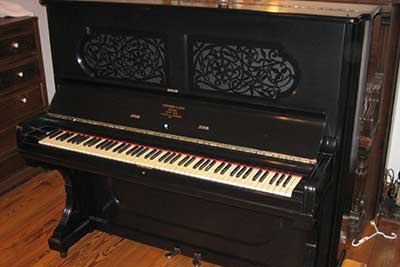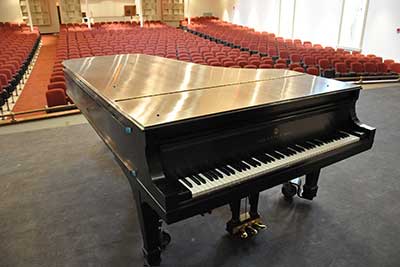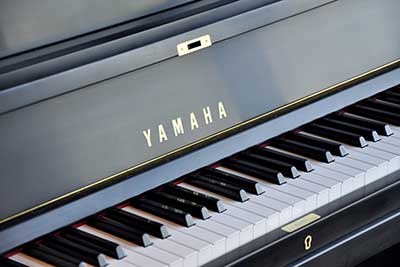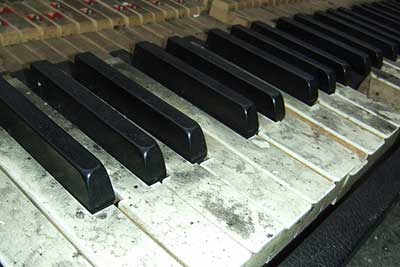Have a Piano to Donate?
Donated pianos are a part of life in institutions around the world. Those of us who are lucky enough to own a piano know that pianos are often passed on from one generation to the next. They almost become a part of the family. There comes a time, however, when no one in the family plays or the family wants to downsize and you’re left with a decision to make regarding the piano. The two most common choices are:
-
- Sell Your Piano
 From a financial standpoint, selling your old piano is very attractive – especially if you have a nice looking instrument with a well-known brand name and a perfect internal condition. …but even then, selling a piano on your own is not that easy. Potential buyers want to know the exact age of your piano, what it’s cabinet looks like, how it was tuned and maintained, how often it was played, etc. You have to take pictures, do a ton of research, establish a price, and post the piano on a couple of websites hoping it will sell quickly. You also have to be ready for strangers to come into your home, evaluate your piano and try to negotiate with you for a lower price. Of course, this process can be lengthy, time-consuming and inconvenient (if not dangerous)… but it is the best way to get the most money for your old piano.
From a financial standpoint, selling your old piano is very attractive – especially if you have a nice looking instrument with a well-known brand name and a perfect internal condition. …but even then, selling a piano on your own is not that easy. Potential buyers want to know the exact age of your piano, what it’s cabinet looks like, how it was tuned and maintained, how often it was played, etc. You have to take pictures, do a ton of research, establish a price, and post the piano on a couple of websites hoping it will sell quickly. You also have to be ready for strangers to come into your home, evaluate your piano and try to negotiate with you for a lower price. Of course, this process can be lengthy, time-consuming and inconvenient (if not dangerous)… but it is the best way to get the most money for your old piano. - Sell or Consign the Piano Through a Dealership
Working with piano sales experts certainly limits your risk, reduces the effort you have to go through to list your instrument, and helps you set a price that will attract buyers. That said, the dealership you work with has expenses as well. They have to move, tune, promote, and warranty the piano. They also have to pay someone to sell it for you. Finally, they have to make some money on the sale for the process to “make sense” from a business standpoint. You may have a much easier time selling or consigning your piano through a dealership (there is never a guarantee on how quickly a used piano will sell), but you won’t get nearly as much money for the piano itself. - Send it to “Piano Heaven”
 Nobody enjoys disposing of an old piano. We just can’t see them rationally. Just like we do with the other members of our family, we ignore their flaws and love them despite their faults! …so when we have to assign an actual numerical value to a piano (something we never do with people), we struggle. …but the fact is, many older pianos have reached (or passed) their “end of life” and should be disposed of. They are no longer viable instruments and restoring them to proper playing condition would cost too much to make sense. That is when we arrive at Option #4.
Nobody enjoys disposing of an old piano. We just can’t see them rationally. Just like we do with the other members of our family, we ignore their flaws and love them despite their faults! …so when we have to assign an actual numerical value to a piano (something we never do with people), we struggle. …but the fact is, many older pianos have reached (or passed) their “end of life” and should be disposed of. They are no longer viable instruments and restoring them to proper playing condition would cost too much to make sense. That is when we arrive at Option #4. - Donate Your Piano
When you don’t want to go through the hassle of selling your piano, you can’t find a dealer who will sell or consign it for you, and you just can’t bring yourself to dispose of the instrument, that is when you are most likely to consider donating it. Donating your piano feels good. You imagine someone else having a similar experience with your piano that you did – or a school, church, theatre, etc. using it in some way that will benefit lots of people! Even better – donating your piano saves you the disposal fee! …so it feels like a “win” for everybody. Sadly – in most cases – this is far from true.
- Sell Your Piano
What most people don’t realize is that schools, churches, concert halls and universities need pianos that are in excellent condition – not old, well-loved pianos that have “done their bit for King and Country.” Institutions require very high quality pianos for two reasons: 1) They deal with very high levels of performances and 2) They typically house their pianos in very challenging climate environments. Thus, the equipment they need has to have excellent tuning stability, good tone, a responsive action and no structural issues. This is not what an “end of life” piano can offer.
 Just like the other members of our family (as much as we hate to say it), pianos deteriorate as they age. Most donated pianos are extremely old and can no longer operate like they did “in their youth.” This doesn’t mean they have to be disposed of, but they might be better candidates for rebuilding or donating to a nursing home, etc. When universities, churches, theatres, etc. are offered a donation, they have to consider their options carefully. They don’t want to take in a piano that will require enhanced maintenance or an instrument that can’t perform in the way they need it to, but they also don’t want to offend the person offering them a “free piano.” In many cases, institutions will accept these inadequate donations to prevent offending their donors… but that doesn’t mean the instrument actually meets their needs. Often, it’s quite the opposite. Now they have an inadequate instrument taking up space and maintenance monies. It’s a net loss for them. (Of course, there are exceptions. When a piano is young, has been well-maintained, and has excellent tone and touch, donating it to a worthy institution or organization is an excellent idea! In this case the recipient will be able to use the instrument to its fullest, and it will hopefully serve them for many years to come.)
Just like the other members of our family (as much as we hate to say it), pianos deteriorate as they age. Most donated pianos are extremely old and can no longer operate like they did “in their youth.” This doesn’t mean they have to be disposed of, but they might be better candidates for rebuilding or donating to a nursing home, etc. When universities, churches, theatres, etc. are offered a donation, they have to consider their options carefully. They don’t want to take in a piano that will require enhanced maintenance or an instrument that can’t perform in the way they need it to, but they also don’t want to offend the person offering them a “free piano.” In many cases, institutions will accept these inadequate donations to prevent offending their donors… but that doesn’t mean the instrument actually meets their needs. Often, it’s quite the opposite. Now they have an inadequate instrument taking up space and maintenance monies. It’s a net loss for them. (Of course, there are exceptions. When a piano is young, has been well-maintained, and has excellent tone and touch, donating it to a worthy institution or organization is an excellent idea! In this case the recipient will be able to use the instrument to its fullest, and it will hopefully serve them for many years to come.)
Whatever you decide to do with your piano, please remember one thing: It’s important to have a technician evaluate your piano’s condition before you decide what to do with it. This prevents you from donating it to a school or church when you should donate it to a nursing home or art gallery. It also prevents you from asking too much for your piano or struggling to find someone who will take it away “for free” (No piano is ever free. Some of the most expensive pianos you can own are pianos you didn’t pay to acquire.)
Dealing With a Piano Donation Offer
If you operate a church music program, a music school or university music program for any length of time, you’ve certainly dealt with your fair share of piano donation offers. Well-meaning folks who no longer have a use for their instruments want to help you – and themselves – at the same time. You don’t want to offend them, but you also don’t want to saddle your program to an instrument that won’t meet your performance needs. So what do you do? How do you diplomatically decline a donation? Here are a few steps you can follow:
Phase 1 – Do Your Due Diligence
 A piano is only as good as the care it was given. Even if a piano sounds great “on paper,” there are a few things you need to know before you can decide if it is right for your program. Find out the brand name and model number for the piano. Get the piano’s serial number so we can find out the piano’s true age for you. Find out how often the piano has been tuned and when it was last tuned. Ask for some photos of the piano. Then, once you have all this information, contact us so we can look it up and tell you the piano’s basic history and value.
A piano is only as good as the care it was given. Even if a piano sounds great “on paper,” there are a few things you need to know before you can decide if it is right for your program. Find out the brand name and model number for the piano. Get the piano’s serial number so we can find out the piano’s true age for you. Find out how often the piano has been tuned and when it was last tuned. Ask for some photos of the piano. Then, once you have all this information, contact us so we can look it up and tell you the piano’s basic history and value.
Phase 2 – Team Up with a Technician
Once the piano passes Phase 1, it’s time to have a piano technician look it over. The small amount of money you’ll pay for this service will save you hundreds (even thousands) down the road. Ask the donor to agree to meet you, your pianist (if you don’t play), and the technician so you can all get an honest look at the piano’s condition and potential viability as a performance instrument. Never just take a piano on faith. Let the donor know that this is your policy and you have to do it before you can accept any donation pianos. If the piano passes inspection, you can move on to Phase 3! If not, you can explain to the donor (with your technician’s help) why the piano will not work for you. You can recommend the donor contact a store, a nursing home, a art gallery, etc. You might even suggest the donor sell the piano and donate the proceeds (perhaps with help from a local dealer).
Phase 3 – Time to Talk Turkey
Before you can accept the donation, you will want to verify that the donor owns the piano free and clear of any financing or legal obligations. Once that is done, you can have the donor sign whatever notice of intent to donate you prefer to use and you can issue them with a donation receipt. Finally, you will want to arrange for a professional piano mover to move the piano to your space.
 What if a donation doesn’t pass muster, but the donor doesn’t understand or accept the technician’s findings? This is why it’s so helpful to have a technician on hand during the meeting. (S)he can explain the piano’s problems again and help your donor gently come to an understanding of the instrument’s inadequacy. (S)he might also be able to suggest repairs or upgrades that would make the piano usable. Perhaps the donor would be willing to put a little money into the piano if (s)he could donate it to the school or church after all. (You could always increase the donation receipt amount to cover the extra work done.) The important thing is to gently help the donor understand what is best for both him or her and your program.
What if a donation doesn’t pass muster, but the donor doesn’t understand or accept the technician’s findings? This is why it’s so helpful to have a technician on hand during the meeting. (S)he can explain the piano’s problems again and help your donor gently come to an understanding of the instrument’s inadequacy. (S)he might also be able to suggest repairs or upgrades that would make the piano usable. Perhaps the donor would be willing to put a little money into the piano if (s)he could donate it to the school or church after all. (You could always increase the donation receipt amount to cover the extra work done.) The important thing is to gently help the donor understand what is best for both him or her and your program.
Even with these steps, there are no guarantees that the instrument won’t develop problems in the near future, such as soundboard cracks, pin block slippage, bridge or action issues, just to name a few. But, if you complete the above phases, you will be less likely to encounter serious, unexpected problems. The last thing you want to end up with is a building full of horrible pianos that you have to pay to maintain or repair.
Donated Pianos: A Horror Story
 Many years ago, I visited a large church in an affluent area of Philadelphia to evaluate their piano inventory. (This is a free service that Riverton Piano Company also offers schools and churches in the Phoenix metro area.) The Director of Music showed me the church’s nine pianos. The sanctuary grand piano was the only piano the church purchased. The rest of their instruments were donated pianos. These rough old pianos were stuffed in classrooms, fellowship halls, Sunday School rooms and the nursery. As we headed to the last piano, the Director cautioned me that there might be a certain smell with it. …and there was! When we walked into the Sunday School room, we found an old console piano that looked horrible with blackened wood in several places. As I approached it, I could smell remnants of a fire and smoke. I couldn’t get near it because the smell was so strong! The Director of Music apologetically explained that the piano was, indeed, in a fire, but the people who donated it were long-time (and very influential) church members, so they couldn’t reject the donation. Instead, the church was forced to store a stinking, burned up old piano that can’t be played so as not to offend some misguided, but well-meaning church members! I had no words! Over my career, I have seen many, many donated pianos, but this situation was one of the worst.
Many years ago, I visited a large church in an affluent area of Philadelphia to evaluate their piano inventory. (This is a free service that Riverton Piano Company also offers schools and churches in the Phoenix metro area.) The Director of Music showed me the church’s nine pianos. The sanctuary grand piano was the only piano the church purchased. The rest of their instruments were donated pianos. These rough old pianos were stuffed in classrooms, fellowship halls, Sunday School rooms and the nursery. As we headed to the last piano, the Director cautioned me that there might be a certain smell with it. …and there was! When we walked into the Sunday School room, we found an old console piano that looked horrible with blackened wood in several places. As I approached it, I could smell remnants of a fire and smoke. I couldn’t get near it because the smell was so strong! The Director of Music apologetically explained that the piano was, indeed, in a fire, but the people who donated it were long-time (and very influential) church members, so they couldn’t reject the donation. Instead, the church was forced to store a stinking, burned up old piano that can’t be played so as not to offend some misguided, but well-meaning church members! I had no words! Over my career, I have seen many, many donated pianos, but this situation was one of the worst.
Don’t end up like this church. Establish a donation policy now and follow it… religiously. Inform members ahead of time that you have a donated pianos policy in place to make sure the donated pianos you take in are right for your program. Follow the phases listed above and stick to the plan. That will prevent you from filling your building up with stinky old clunkers.
…and if you’re thinking about donating a piano to your school or church, have it evaluated first. Make sure the instrument you intend to donate will be a blessing (not a curse) to the church or school you wish to benefit. If everyone works together, we can funnel retired pianos out of performance spaces and make sure the instruments we use for learning and worship are truly up to the task.
…and – as usual – if you have any questions about this process, contact us today and let us help you find the perfect school piano or ideal church piano for your program’s needs!





